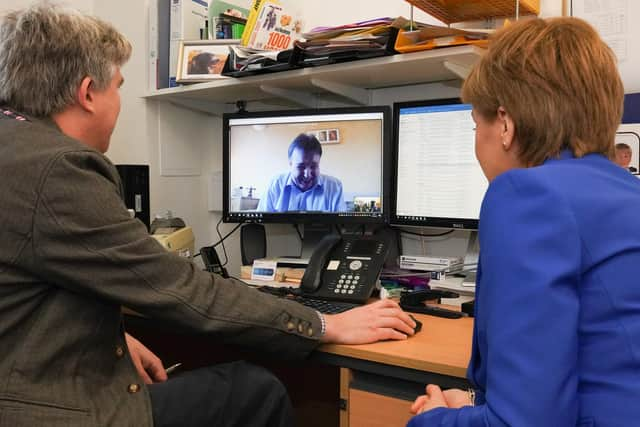One year of Covid in Scotland: How the pandemic might change the face of healthcare
Infectious diseases experts had been on high alert since the news of a new pneumonia in China. Hospitals were scrambling to order personal protective equipment (PPE), train staff and develop protocols to survive the looming crisis.
Health and care staff on the frontline were suddenly forced to revolutionise their way of working, from head-to-toe PPE to video consultations to standing in for a patients’ friends and family while visiting was suspended.
Advertisement
Hide AdAdvertisement
Hide AdSome of these changes have already been scaled back – staff wear less PPE in some situations now more is known about transmission – and some, such as visiting bans, are linked to case numbers.
But other Covid-inspired health and social care revolutions, for better or worse, might be here to stay.
In 2017 NHS Highland piloted a platform, now known as ‘Near Me’, which allowed people in remote and rural areas to access GP appointments by video.
There were plans to gradually increase the use of video consultations across Scotland in 2020, but these were soon upended and a major project began to extend the capability of the programme.


In March last year, Near Me was hosting around 300 video consultations a week in Scotland. By May this had risen to 14,000, and in the first week of March this year, it was over 21,000.
Video and phone consultations have now been extended to some outpatient hospital services, as well as some care homes, in a move towards ‘telemedicine’ that was perhaps inevitable, but has been hugely sped up by the necessity of the past year.
"The way we’re working now, speaking to patients before we see them in the surgery, whether it’s by video or by telephone, has many advantages,” said Patricia Moultrie, deputy chair of the British Medical Association Scotland GP committee.
"It allows us to understand what the problem is, the urgency of the situation, and also might allow us to redirect the patient to somewhere more appropriate.”
Advertisement
Hide AdAdvertisement
Hide Ad

Dr Moultrie said phone consultations were the most common virtual intervention among GPs, and that other methods have been used as well, including secure email transfer of symptom photographs.
Just under half of respondents to a survey by The Scotsman in September about life after the Covid-19 pandemic said they would be happy to see a GP by video call in future, slightly less than the 60 per cent who said they would be happy with telephone appointments.
However, in-person appointments were the most popular option at 82 per cent.
There are limitations to virtual healthcare, some of which were raised in a report published last year.
Oxford University academics who conducted research on the Near Me system before the pandemic noted that not all ailments were suitable for video consultation, and that internet connectivity was crucial, as well as access for those with disabilities, which makes video calls more difficult.
Adam Stachura, head of policy at Age Scotland, said while he is not concerned that in-person GP appointments will completely disappear after the pandemic, his organisation will “keep banging the drum” for those who cannot access virtual consultations.
“Digital is the easy option, but for lots and lots of people it’s not accessible and they will be left behind,” he said.
He added: “We want to embrace new ways of being able to access health services, but let's just not go so far away from what we’ve had, with the unintended consequences it brings.
Advertisement
Hide AdAdvertisement
Hide Ad“There are about half a million over-60s in Scotland who still don’t use the internet, and their ability to do video consultations is almost nil. They have access to phone consultations, but I think seeing somebody probably beats a phone call.”
Mr Stachura said for some isolated older people, their family doctor may be the only person likely to notice if they are deteriorating, or suffering from common ailments in older people like malnutrition or dehydration, which are easier to spot visually.
Dr Moultrie said she “absolutely” expects that face-to-face consultations will continue to play a major role in GP consultations.
“We have to consider the health inequalities impact of this – not every patient has access to the equipment or has data on their telephone to be able to do this,” she said.
"We have to be very alert to how different sections of our patients are affected by that.”
But Dr Moultrie said some patients preferred virtual care, especially younger people and often those who have booked an appointment to talk about mental health.
"The way we’re working now, speaking to patients before we see them in the surgery, whether it’s by video or by telephone, has many advantages," she said.
"It allows us to understand what the problem is, the urgency of the situation, and also might allow us to redirect the patient to somewhere more appropriate.”
Advertisement
Hide AdAdvertisement
Hide AdDr Moultrie wants to see the profession given time to reflect on the best way of working in future.
The Royal College of GPs also expects a mix of virtual and face-to-face appointments in future.
"We recognise there is a not a one-size-fits-all method of providing care to patients,” said Dr David Shackles, joint Scotland chair of the college.
"Remote care can be a convenient option for some patients. However, not all our patients have access to technology or are confident in using it.”
He added: "Going forward, more work needs to be done between the profession, the government and patient groups, to ensure that the introduction and development of these new ways of working can best provide for the health care of the Scottish population as we move beyond the current pandemic.”
A message from the Editor:Thank you for reading this article. We're more reliant on your support than ever as the shift in consumer habits brought about by coronavirus impacts our advertisers.
If you haven't already, please consider supporting our trusted, fact-checked journalism by taking out a digital subscription.
Comments
Want to join the conversation? Please or to comment on this article.